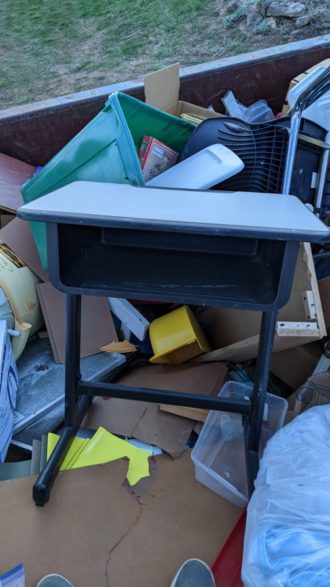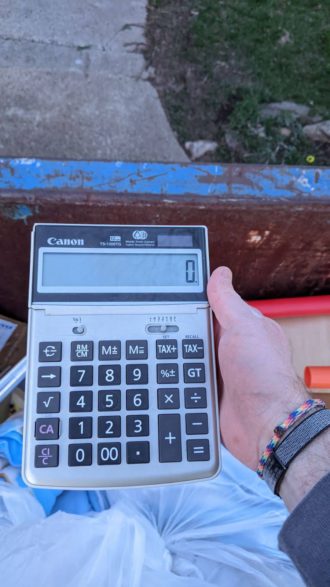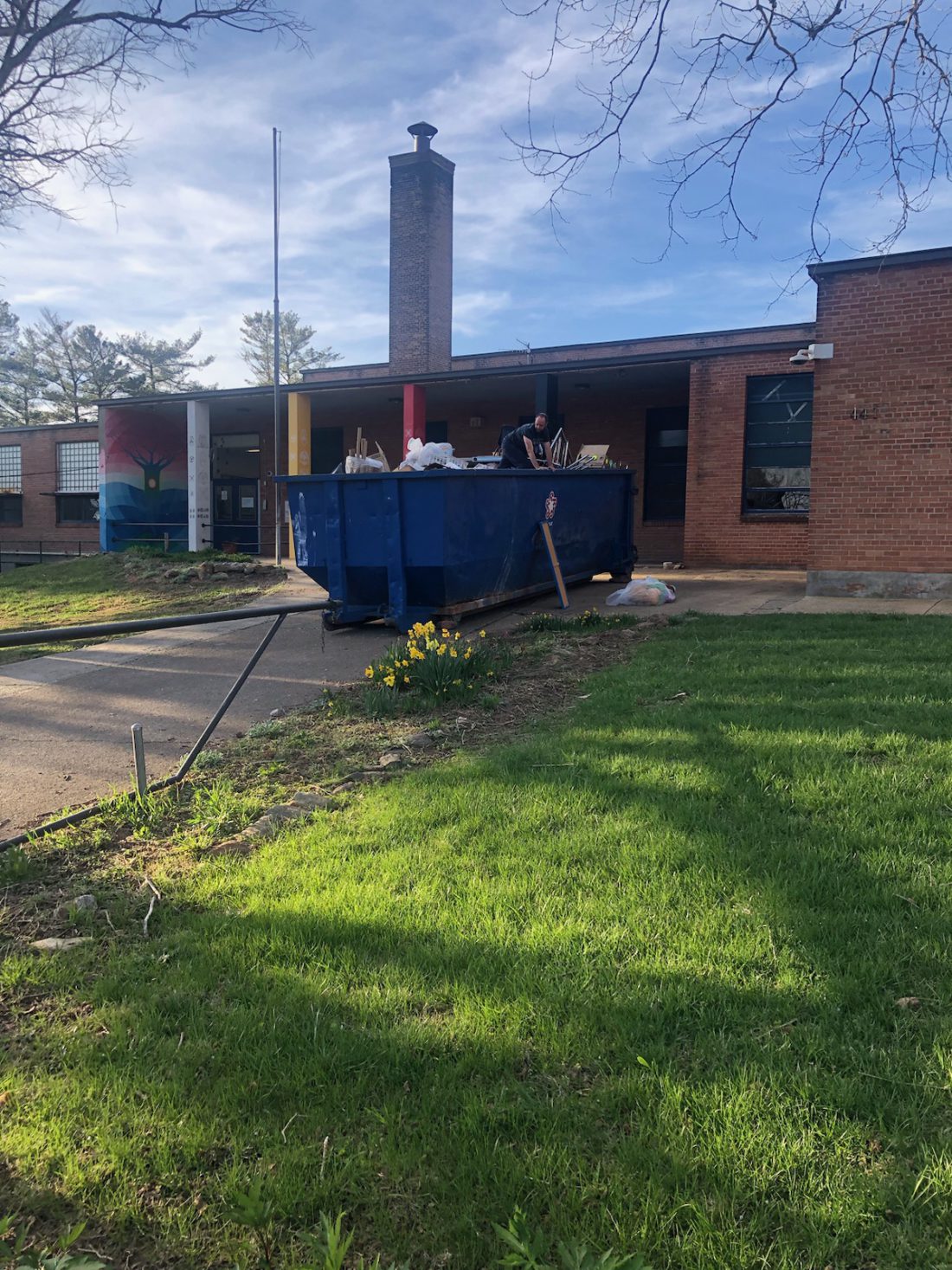On the evening of March 12, West Asheville resident Sophie Min Mullinax posted eight photos in a neighborhood Facebook group. The images showed a dumpster in front of the former Asheville Primary School at 441 Haywood Road, as well as many of the items that had been discarded.
“It seems ACS is clearing out the building,” Mullinax wrote, referring to Asheville City Schools. “We are trying to spread the word to save usable items from the landfill: school and art supplies, elementary-sized school furniture, toys, lots of construction paper, etc.”
The Asheville City Board of Education voted to close Asheville Primary following the 2021-22 school year, due to financial woes.
Following the Facebook post, and another post on Reddit, people came to pull out items to take. That is, until an Asheville Police Department officer arrived March 13 to discourage them.
Some parents who spoke to Xpress are angered that, despite ACS’ well-known budgetary issues, usable school supplies were discarded rather than dispersed to other teachers in the district or recycled. Others are upset that APD was deployed, seemingly to guard the dumpster. But the biggest sting seemed to be the timing. The dumpster arrived one day after the school board voted to close Montford North Star Academy and merge it with Asheville Middle School.
“It felt like a real smack in the face,” says West Asheville parent Kari Holloway.
“The poor parents of ACS have been through enough,” she continues. “It shouldn’t have been handled that way.”
Following criticism from parents, ACS released a statement March 13. “[W]e acknowledged the presence of recyclable paper and other unusable products that, for reasons unclear, were not disposed of immediately after the school’s closure,” it read. “This oversight has prompted us to reevaluate our procedures to ensure that all materials are managed efficiently and responsibly moving forward.”
What should have happened
According to ACS policy, managing a school’s equipment and supplies is organized by the superintendent, and the goals are to extend materials’ useful life through reuse or disposal of property in an environmentally sound manner. That procedure was followed at Asheville Primary — until it wasn’t, says ACS chief of staff Kimberly Dechant.
When Asheville Primary closed two years ago, elementary principals were invited to take any of the kindergarten through second grade materials, and media coordinators were invited to take any books they could use at their own schools, she explains.

Preschool supplies were handled separately, as they were purchased with funds that require their usage only for preschool classrooms, Dechant says. When Asheville Primary closed, preschool education director Susanna Smith and the preschool staff organized and removed some items. But other supplies remained in storage, with the intention of being reallocated in the future. Smith regularly visits 441 Haywood to obtain items from storage to use in existing classrooms, Dechant says.
The Asheville Department of Developmental Services issued a permit for “commercial repair or upfit” on March 11, according to Buncombe County property records. Dechant says in early March the ACS operations department asked Smith to clear out Asheville Primary to make room for district offices moving in. Smith and ACS programs operation manager LeAnn Wright “went through all the materials to see if anything was broken, or if there were any missing pieces or whether [materials] met or did not meet the licensing regulations for this state and [federal government].”
Smith and Wright “moved some broken stuff in the hallway, saying, ‘These things need to be discarded,’” explains Dechant, citing a “rotted” whiteboard as an example. When asked how usable items, such as unopened packages of paper, made it into the dumpster, she said she didn’t know. “What I do know is [Smith and Wright] said, ‘Everything that’s on this side of the hallway needs to be disposed of’ and ‘what’s [on the other side of the] hallway needs to stay,’” Dechant explained. “And what I believe — and this is not fact, this is my assumption — is that somebody that was not an active listener thought that everything in the hallway needed to go.”
As for technology, the district has a specific procedure for assessing its use elsewhere. Or, if it’s no longer functional, the district has a method for safely discarding it, Dechant says.
The ACS finance department also posts supplies on GovDeals, a government surplus auction website. On March 22, Asheville City Schools auctioned seven toddler chairs, 17 toddler cubbies, nine preschool-sized cots and a preschool kitchen playset from Asheville Primary.
Dumpster diving
Meanwhile, a friend alerted Mullinax’s family about the dumpster on March 12, and her partner arrived at the former school around 8 p.m. to investigate. He removed items from the dumpster and placed them on the ground for others to take.
According to the couple, items included a dozen student chairs, student-sized chalkboards, white boards, over 30 empty plastic storage bins, calculators, plastic lunch trays, art supplies, children’s clothing and unopened boxes of printer paper and construction paper.
Mullinax says she felt “disgust at the waste produced by a school district that has a lot of financial trouble right now.” Her daughter attended the Montessori preschool program at Asheville Primary for one year before the school closed.
“I’m sure there’s a reason that they did it, or maybe they thought it would just be easier, or didn’t want to invite the attention or the mess,” Mullinax says. “But putting a dumpster in front of the school certainly provided a lot of attention.”

Mullinax says she contacted ACS Board of Education member and West Asheville resident Liza Kelly, who confirmed to Xpress she shared information about the dumpster with other members of the school board and ACS Superintendent Dr. Maggie Fehrman. Kelly declined to share more information about those conversations.
Some of the items in the dumpster that may have appeared usable actually were not, Dechant says. “It is my understanding that the items that were discarded were broken chairs from the old Issac Dickson [Elementary School] that had mold on them from a separate storage building that they had been housed in that leaked,” she wrote in an email. “Other items included dried markers, glue, etc.”
Dechant says the situation should not repeat itself at Montford North Star when it closes, as those teachers will have their supplies transferred to their new classrooms.
Another ACS program may make use of any supplies left behind. “I see that as a smooth transition of materials because … the goal is to have the Education and Career Academy coming into that facility,” Dechant says. The Education and Career Academy, a high school-level alternative program, is renting space at the Housing Authority’s Arthur R. Edington Center.
What Dechant does not want to see is families feeling hurt again. “I hate to use the word ‘optics’ because that seems so callous, but you have to be sensitive to people,” she says. “You’ve got to think about timing and people’s hurt feelings. That [dumpster] was just not good timing for our community.”




Maybe city council can pass a resolution condemning this wasteful act committed by the city school board.
They would need to hire consultants first and engage in a lengthy and costly exercise and then repeat the process ad nauseum (as per their normal methodology).
No, the city won’t take any action until a consultant is hired. Why don’t they dump Debra Campbell and hire a consultant as city manager? Having Campbell just doubles and triples the cost because she is unable or afraid to make any decisions.
These types of things are thrown away every day by individuals and business.
It takes someone to go through and sort items some work some don’t.
Someone one has to categorize and inventory items
Someone has to pick up the items and move to storage or other location.
Someone to monitor and determine where they can possible be used.in the future.
Some items the article said had already been previously stored and now had mold on them,
You can’t let people not covered by works comp wander around school property.
It might make you feel better to do this but in many cases you end up with more money in used things than the cost for new supplies and equipment.
Good will or habitat restore can help recycle what there’s a demand for..